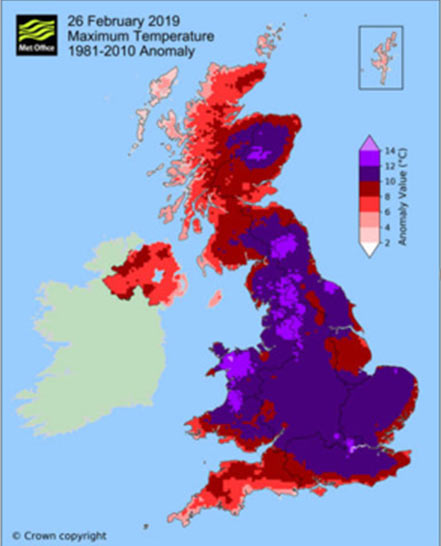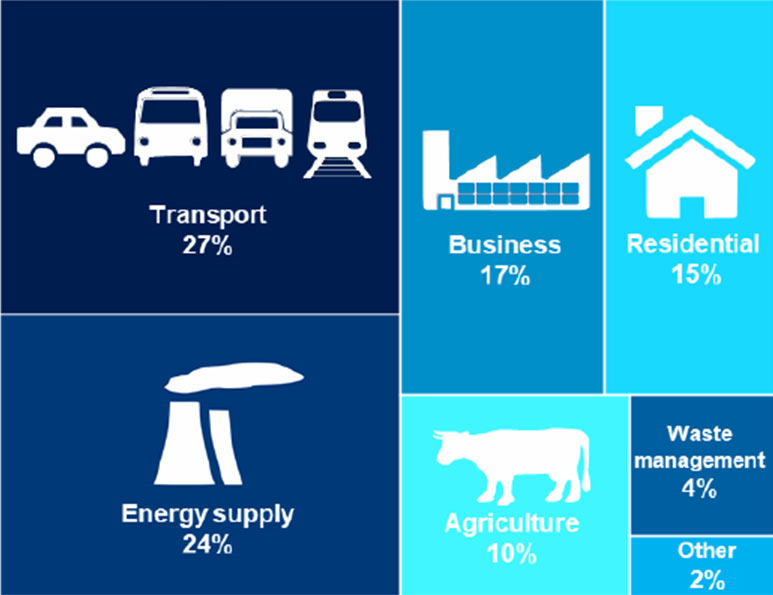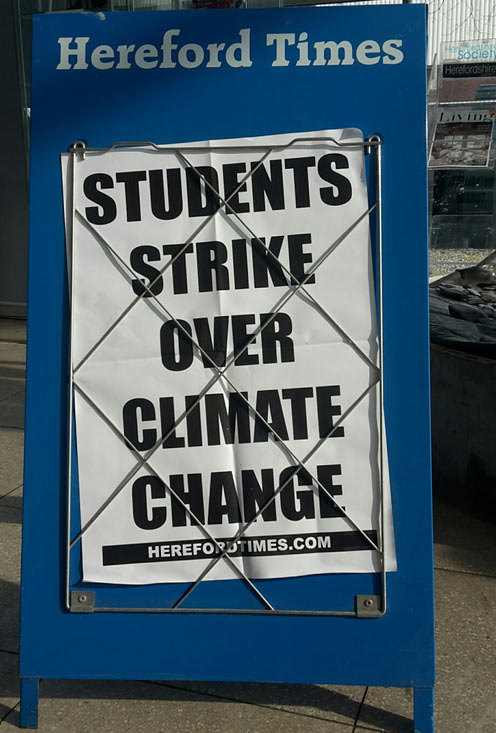"Is climate change real?"
Recently I was asked this question. It seems strange that people are still asking this when we see evidence of it all around us.
The hottest 20 years on record have happened in the last 22 years with the last four being the hottest. The impacts of climate change are already being felt in the UK.
The weather forecast in Britain
The weather is a favourite topic of conversation among us Brits with most of us tuning into a weather forecast every day. And we've had good reason to talk about the weather. As well as deciding our clothes and sometimes our mood, weather impacts most things from the food we grow to high street sales.
Four seasons in one day
The UK has a temperate climate and four seasons we know and sometimes love. However, climate change is throwing many of these traditional aspects that we take for granted in the air. Yes, the weather is always variable. Yes, you can explain any phenomena in terms of the weather that occurred to produce the extreme wind, rain, or temperatures. But what is changing, undoubtedly, is the frequency and severity of these extreme weather events. That is what climate change is.
Many of us basked in record-breaking temperatures in February. Enjoying the sunshine and topping up our levels of vitamin D. But while we've all enjoyed soaking up a few rays, very few radio or TV show mentioned global warming. Radio 5 live and their cool planet series, with Rachel Burden and Nicky Campbell, is one notable exception. And this conversation does matter.

What are the impacts of climate change
While it's easy to enjoy the sunshine, it can bring deadly problems. More than 600 people died prematurely in the UK due to our heatwave in summer last year. Drought saw wildfires spread across moors and park land and many British fruit and vegetable yields were down 20 per cent due to the terrible weather that farmers faced.
Global warming is causing the planet to become hotter, upsetting the balance of its ecosystems. It is also increasing the numbers of extreme weather events, bringing flooding, droughts and fires. The floods of 2015/16 alone cost our economy £1.6 billion and many people lost treasured possessions and were out of their homes for over a year suffering huge stress in the process. And overseas, the Camp Fire in California that spread through many celebrity homes, cost over $16 billion.
Climate change is happening, no one is immune to its impacts and worse is to come. This is the legacy we are passing onto future generations. We cannot bring back extinct species or refreeze the ice that is melting at unprecedented rates. However, what we can and must do is put the brakes on. We have to limit how fast the planet warms and that means keeping fossil fuels in the ground. We must stop burning coal, oil and gas as fast as possible.
How can we stop global warming
The UN Intergovernmental Panel on Climate Change (IPCC) - a collection of the world's leading scientists - said in October 2018 that we have a limited window for global warming to be kept at 'safe' levels to 1.5C above pre-industrial temperatures. To do this we have to cut carbon pollution by nearly half in 12 years. This requires "rapid, far-reaching and unprecedented changes in all aspects of society".
But this is easier said than done. One week after the IPCC report came out, the Chancellor delivered a budget that didn't mention climate change but gave an extra £30 billion for road building. Onshore wind farms are banned and policies to make our homes warmer through insulation were scrapped. No wonder school children are going on strike and law-abiding citizens are protesting in the streets.
What causes climate change?
Human activities cause climate change. In the UK, transport is the largest source of carbon emissions, as well as the main source of toxic air. Therefore, tackling pollution from cars and planes is essential and should be a priority. We have the solutions to our car problem in the form of electric vehicles, public transport and cycling and walking. But Government support is needed to make sustainable transport the norm, not the exception. The same with renewable energy.

Currently, carbon-intensive, fossil fuels account for 80% of our energy consumption whilst clean, renewable energy is just 10% in 2017.
This transition to a zero-carbon future won't happen without action from Government, business and across society. Despite all the warm words on climate change for the last 30 years, global carbon dioxide emissions in 2018 increased by 2.7 per cent.
Increasing climate action
There needs to be a complete shift in thinking on climate action because we cannot live on a planet that keeps getting hotter. It is 50 years since Neil Armstrong walked on the moon. Anything is possible if we put our mind to it.
Stopping this crisis now needs to be the number one priority. There is hope. More and more councils are declaring a climate emergency, many of us are choosing to buy green electricity, cycle more or drive electric cars and speak to their MPs about the environment.
Climate change is a disaster and it is of our own making. While ice creams in February seem fun, if the cost of this hot weather is fires, floods and famine, then I would prefer a hot chocolate any day.
We are the last generation that can stop climate change - let's take that responsibility seriously. We can do this by working together - for all our sakes - I hope we take action on climate change soon. The benefits of climate action are huge.
The consequences of doing nothing are unthinkable.

